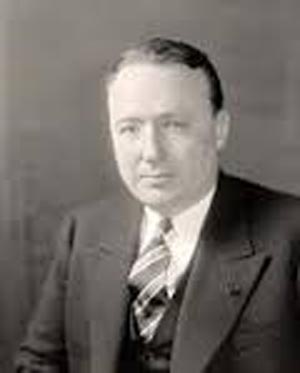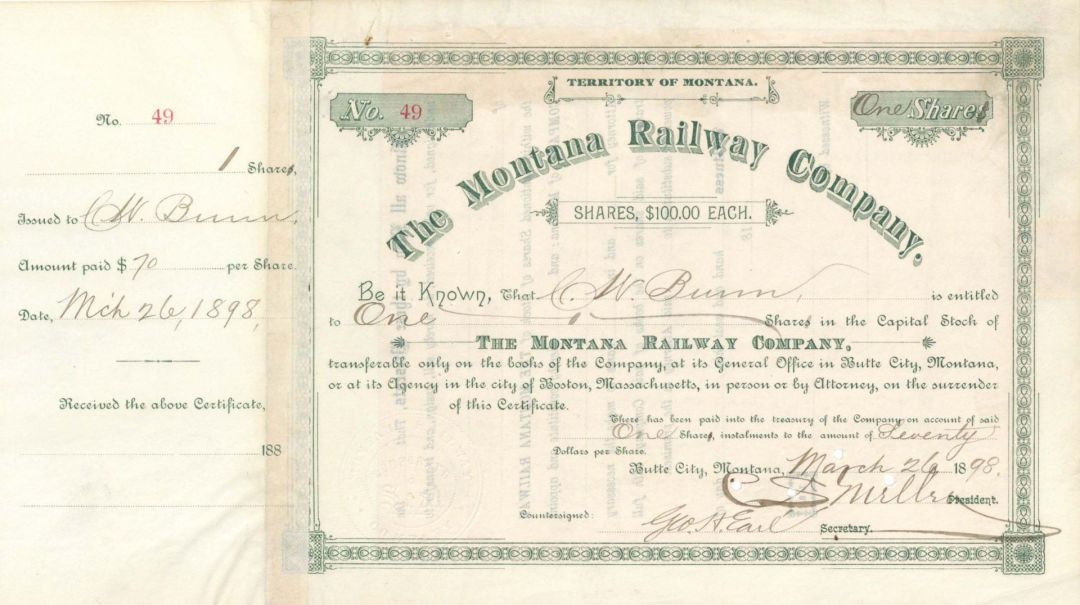Montana Railway Co. signed by C.S. Mellen and Geo. H. Earl - 1898 dated Autographed Stock Certificate
Inv# AG1594 AutographStock signed by C. S. Mellen as president and Geo. H. Earl as secretary. Earl also signs on the back as a witness. Portrait and biography of Mellen included with stock. 2 revenue stamps on back.
Charles Sanger Mellen (1852-1927) Charles Sanger Mellen was an American railroad man whose career culminated in the presidencies of the Northern Pacific Railway 1897-1903 and the New York, New Haven and Hartford Railroad 1903-1913. Mellen was born in Lowell, Mass. His family soon moved to Concord, N.H. where he attended high school. Rather than attending college, he began his railroad career as a clerk at the Northern New Hampshire Railroad in Concord in 1870. After a short time at the Central Vermont Railroad and back to the Northern New Hampshire Railroad, he moved to the Boston and Lowell Railroad (B&L) where he was promoted to Superintendent. The Boston and Lowell enjoyed revenues from leasing use of its lines into Boston to the Boston and Maine Railroad. Its policies led the B&M to build its own line into Boston and to fight with the B&L to the New Hampshire courts. Mellen was the President of the B&L when it lost its court case, and ceased independent operations in 1887 when it was leased to the Boston and Maine Railroad. In 1892, he became general manager of the New York and New England Railroad, during a time when it was engaged in a bitter war with the New Haven. Charles P. Clark, the New Haven's president, hired him away from his competitor in November 1892. Mellen later testified that "[Clark] said I was too much of a nuisance on the New England." Mellen came to the attention of J. P. Morgan when he drove such a hard bargain with the New York Central that Chauncey Depew complained to Morgan, a director of both the New Haven and the New York Central. Morgan's bank had become receiver of the Northern Pacific in August 1893. Mellen had an active role in the reorganization and became president of the NP when it emerged from receivership in 1896. During his tenure there, NP's gross revenue increased by 156%, some of the increase at the expense of the Great Northern Railroad (GN), part of the same supposedly anti-competitive Northern Securities Company as the NP. Furthermore James J. Hill, founder of the GN and part of the Trust, called Mellen and his Morgan-appointed predecessor there "overrated underachievers". But by this time Mellen had become a staunch Morgan man. But yet he was not fully informed about the machinations of Morgan, Hill, and Harriman concerning stock in his company. On Monday, May 6, 1901 the Morgan interests were buying up NP stock. On Tuesday Mellen wired an NP vice president in New York "Cannot you give me some idea what is transpiring, to explain tremendous movement our stock?" By 1903 Morgan's priorities had changed. Upon assuming the New Haven presidency in Mellen undertook a program of "Morganization" of transportation in New England that extended from railroads to steamship lines and street railways. The New Haven even bought control of the chronicly unprofitable New York, Ontario and Western RR. His approach was marked by high prices for acquisitions, costly construction, and high debt levels. The failed Morganization of the New Haven was among the great embarrassments to the Morgan interests. The Mellen-Morgan policies led to the New Haven's future financial troubles, culminating in bankruptcy in 1935. Mellen's Morganization efforts in New England also put him in executive positions at the Maine Central RR, the New York, Ontario and Western RR, and the Boston and Maine RR. J. P. Morgan was aged and ill when the difficulties of the New Haven and other efforts led him to be summoned to give testimony before the Pujo Committee. Morgan died 1913-03-31. Mellen shouldered the burden of testifying and faced indictments. He provided colorful testimony concerning nearly $10,000,000 disbursed in connection with acquiring the franchise for the New York, Westchester and Boston Railway and resolving a franchise dispute with the New York and Portchester Railroad.

George Howard Earle Sr. (1823-1907) Mr. Earle was of old New England Quaker stock, and he was the seventh in descent from Captain Ralph Earle, of Portsmouth, R. I. His parents were Thomas Earle and Mary Hussey, and they came to this city from Massachusetts immediately after their marriage. The son was born here on December 8, 1823.
George H. Earle received most of his education in the schools of this city. He attended a private school in Massachusetts for one year. In accordance with the practice obtaining among the Friends at that time, he was apprenticed to Matthias Baldwin, founder of the locomotive works, and served for a time in his shop.
When he reached the legal age, he decided to study law. After his admission to the Bar he spent the year 1848 in a pedestrian tour through Europe. It was an eventful journey. Owing to the political disturbances which were agitating Europe at that time, he was frequently suspected of being a spy. In Vienna, Rome, Naples, Munich and Paris he saw conflicts in the streets between citizens and soldiers. In Paris he narrowly escaped being killed.
After the year of travel he returned to this city and opened a law office in partnership with Richard P. White, his brother-in-law. Thomas Earle died the same year, and the son fell heir to his father's large practice. About that time he married Ellen Frances von Lohr, the wedding taking place on April 5, 1849.
For nearly fifty years the law firm of Earle & White enjoyed a lucrative and an extensive practice. George H. Earle soon began to assert himself as a champion of the slave and also as a municipal reformer. As a boy he had taken part in an anti-slavery demonstration, and he was wounded at the riot attending the burning of Pennsylvania Hall.
He defended many slaves captured under the provisions of the Fugitive Slave law, and on more than one occasion obtained the release of his clients. He was a delegate to the first Republican National Convention, in 1856, which nominated John C. Fremont for the Presidency. Until his death he was the oldest living delegate to that convention. He took the stump and took part in the campaigns which preceded the election of Lincoln and Grant.
After the Civil War he turned his attention to municipal affairs. As a result of the political abuses of that day the debt of the city was almost $70,000,000. He led in the movement to have the city's affairs conducted on a business basis, and he was one of the organizers of the taxpayers' association for municipal reform, of which Henry C. Lea was chairman. This association was succeeded by the Committee of One Hundred. Mr. Earle took an equally active part in the work of the committee, and as chairman of the Committee on Public Meetings he arranged all the notable gatherings. At these meetings Mr. Earle was himself a speaker. His manner was simple yet powerful, and when he desired to be, he was deliciously satirical. He kept up the fight for municipal regeneration until the adoption of the Bullitt Bill, and since that time he had kept in close touch with public affairs, although not being an active participant.
The noted Abolitionist was an intimate friend of Abraham Lincoln. In fact, there were few great men in the country's history for the past fifty years with whom he did not have close acquaintance."











Ebay ID: labarre_galleries